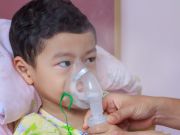- Could Your Grocery Store Meat Be Causing Recurring UTIs?
- Are You Making This Expensive Thermostat Error This Winter?
- Recognizing the Signs of Hypothyroidism
- 10 Strategies to Overcome Insomnia
- Could Artificial Sweeteners Be Aging the Brain Faster?
- Techniques for Soothing Your Nervous System
- Does the Water in Your House Smell Funny? Here’s Why
- Can a Daily Dose of Apple Cider Vinegar Actually Aid Weight Loss?
- 6 Health Beverages That Can Actually Spike Your Blood Sugar
- Treatment Options for Social Anxiety Disorder
Study Will Track Coronavirus in Kids, Their Families

U.S. researchers have started enrolling participants in a study to assess the rate of new coronavirus infection among children and their families.
The study — sponsored and funded by the U.S. National Institute of Allergy and Infectious Diseases (NIAID) — will also examine if rates of new coronavirus infection differ between children with and without asthma or other allergic conditions.
“One interesting feature of this novel coronavirus pandemic is that very few children have become sick with COVID-19 compared to adults,” said NIAID Director Dr. Anthony Fauci.
“Is this because children are resistant to infection with SARS-CoV-2, or because they are infected, but do not develop symptoms?” Fauci said in a NIAID news release.
The researchers seek to enroll 6,000 people from 2,000 U.S. families already participating in National Institutes of Health-funded child research studies in 11 cities.
The study will include both healthy children and children with asthma or other allergic conditions. Researchers will follow these children and their families for six months to determine who gets infected with the new coronavirus, whether the virus is transmitted to other family members, and which family members with the virus develop COVID-19.
Dr. Tina Hartert, director of the Center for Asthma and Environmental Sciences Research at Vanderbilt University in Nashville, Tenn., will lead the new study.
“So far, data on the extent of SARS-CoV-2 infection in the U.S. population have been limited to people who physically interact with the health care system: those who are tested, especially those who test positive, and those with severe disease,” Hartert said in the release.
“These data provide real-time guidance in a setting of limited test availability, but they don’t enable us to understand the full extent of SARS-CoV-2 infection in the entire population. The [new] study will help fill this knowledge gap and inform public health interventions,” she said.
More information
The U.S. Centers for Disease Control and Prevention has more on COVID-19.
Source: HealthDay
Copyright © 2026 HealthDay. All rights reserved.










